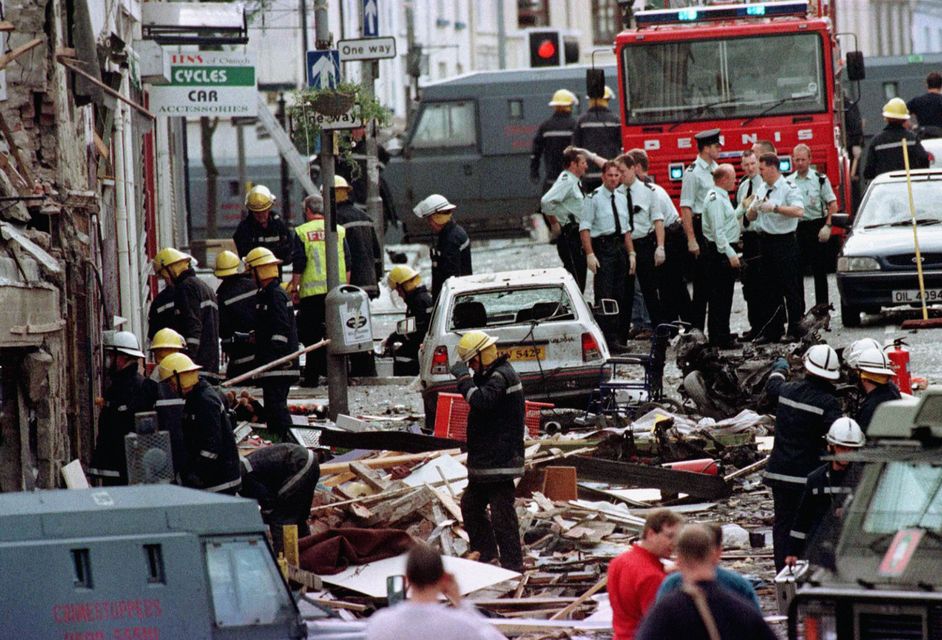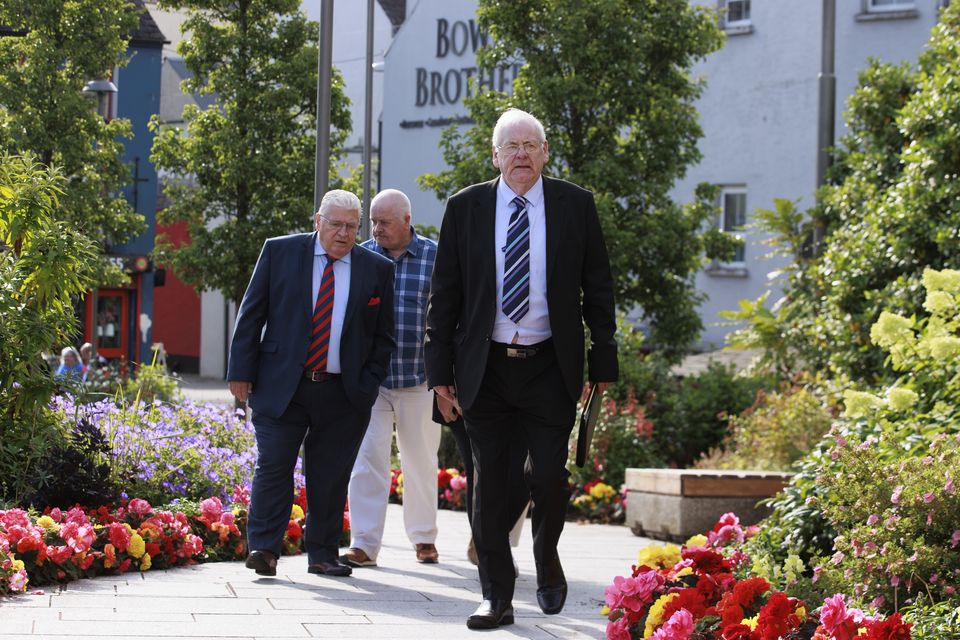The chair of the Omagh Bombing Inquiry has vowed it will undertake its work “rigorously and fearlessly”.
Scottish judge Lord Turnbull was speaking during the first public hearing of the probe into the 1998 atrocity which claimed 29 lives, including a woman pregnant with twins.
Bereaved families and survivors gathered at the Strule Arts Centre in the Co Tyrone town for the hearing in the inquiry which will examine whether the atrocity could reasonably have been prevented by UK authorities.
The names of all those killed were read out during proceedings and those in the hearing room stood for a minute’s silence in their memory.
Police officers and firefighters inspecting the damage caused by a bomb explosion in Market Street, Omagh (Paul McErlane/PA)
In his opening statement, Lord Turnbull said the pain of bereavement and trauma caused by the dissident republican bomb attack spread beyond Omagh and Northern Ireland to families from England and Spain.
He also said the attack, which came just months after the signing of the Belfast/Good Friday Agreement, caused “outrage and consternation across national boundaries and across continents”.
“Condemnation was expressed by the Prime Minister of the United Kingdom and the Taoiseach of the Republic of Ireland, other world leaders, community leaders, religious leaders and political leaders all joined with them in expressing the unforgivable nature of what had occurred,” he said.
Lord Turnbull said the inquiry will undertake its task rigorously and fearlessly, and emphasised the “defining character of the inquiry must be its independence”.
He said “the value which the inquiry attaches to its independence means that it will not be amenable to influence from any government or from any state agency”.
“It will not allow itself to be deflected from its purpose by the difficulties which may lie in its way on account of the passage of time or the volume and complexity of materials,” he said.
Lord Turnbull also told the hearing that he will approach the task with an open mind, and “will assess the evidence which is heard both fairly and reasonably”.
“I will do so without any preformed view or impression as to whether the atrocity could or could not have been prevented,” he added.
Bereaved families expressed hope as they arrived for the hearing after decades of campaigning for a public inquiry into the atrocity.
Omagh bomb campaigners Stanley McCombe, left, who lost his wife, Ann; and Michael Gallagher, right, who lost his son, Aiden, arriving to the Strule Arts Centre in Omagh (Liam McBurney/PA)
Michael Gallagher, whose son Aiden was killed in the atrocity, said today’s hearing will be the first time since 1998 that all of the bereaved families, including those caught up in the blast from Spain, will come together.
Speaking as he arrived at the Strule Arts Centre on Tuesday morning, Mr Gallagher said it had taken a long time to get here.
“It has taken us 26 years to get here and we’re just delighted,” he said.
“One of the sad ironies is that when I got up this morning and saw the sunshine, it was exactly the same on August 15 1998. It was one of the most beautiful days of that year.
“It’s good to be here. It’s a long time but we are where we want to be and we just have to wait and see where this inquiry takes us.
“Every morning I waken up and still pinch myself, I can’t believe that we’re there.”
Stanley McCombe, who lost his wife, Ann, in the bombing, said he had great faith in Lord Turnbull and his legal team.
“After years of hard labour we’re hopeful, we’re very very hopeful,” he added.
Commemorative and personal statements are set to be made during inquiry hearings next January.
The Irish government, earlier this month, formally agreed to provide assistance to the inquiry.

